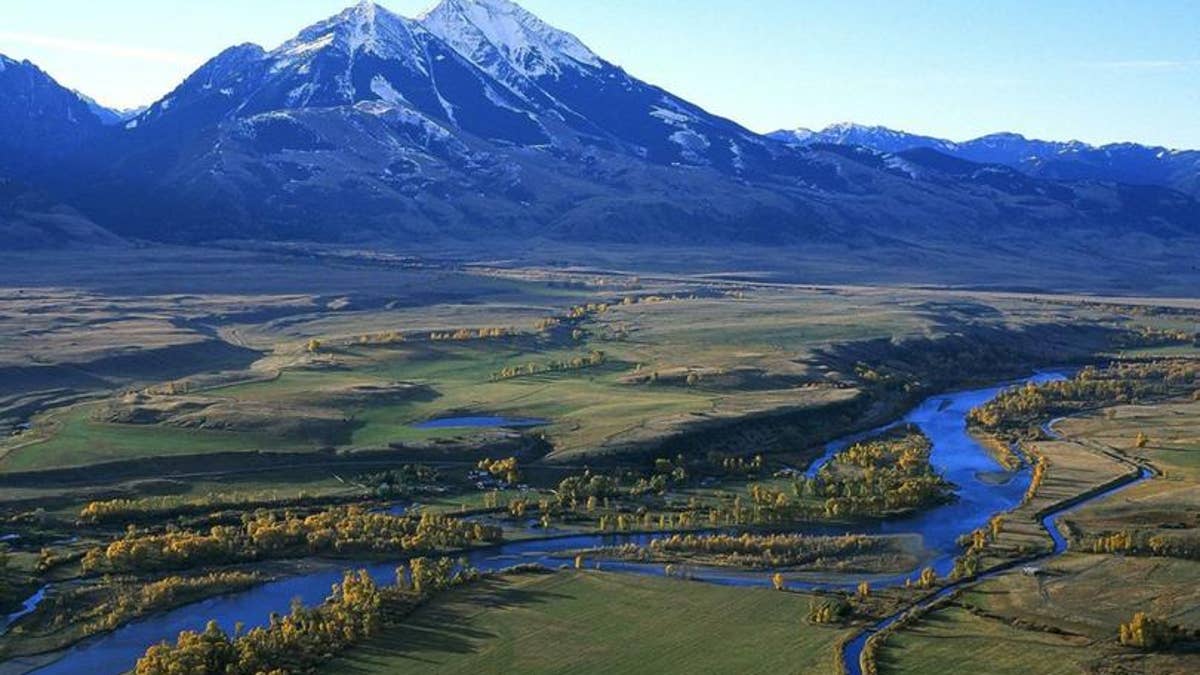
A view of the Yellowstone River running upstream between Livingston and Yellowstone National Park. Parts of the river have been closed since Friday after parasitic disease killed thousands of whitefish. (AP File Photo)
It may be the height of fishing season in Yellowstone but local businesses are no longer booming.
On Friday, local wildlife services closed down several areas along a 183-mile stretch of the Yellowstone River while biologists try to prevent the spread of a parasite believed to have killed tens of thousands of whitefish. The parasite causes fish to contract a fatal kidney disease and die. FWP spokeswoman Andrea Jones said the disease can have a mortality rate as high as 90 percent.
The river ban isn’t just relegated to fishing—but rafting, kayaking tubing and other river activities have been banned, too.
Now Yellowstone River-based businesses, like fly fishing outfitters and raft guides, that rely on summer tourists, are scrambling to deal with the potential ramifications of a months-long dry spell.
“Everybody is kind of in shock right now, and it’s hard because we don’t have any answers,” Robin Trotter, owner of Yellowstone Raft Company, told the Bozeman Daily Chronicle.
Her company, based in Gardiner, Mont., employs about 20 people and has been busy contacting customers who booked August and September rafting trips months in advance. Trotter says she has a “couple hundred” clients who need to be rebooked-- but time is running out.
“We’re open for another month, so if you take a month out of your five-month season, it’s pretty impactful.”
According to the University of Montana’s Institute for Tourism and Recreation Research, guiding and outfitting accounts for nearly $20 million of annual visitor spending in Park County, which includes a small part of Yellowstone National Park.
Dan Gigone, owner of Sweetwater Fly Shop in Livingston, Mont. says that although his biggest month is usually in July, with such a short season, any business losses could have a major impact on his annual revenue.
“I’ve had better days,” Gigone said. “It’s going to have a big impact on both the guiding and the retail side of things.”
Sweetwater’s fishing guides stopped taking tours Friday morning and, like Trotter’s employees, began making calls to clients who booked trips in the near future to cancel and provide refunds.
“We still have a bunch of trips scheduled for the next few weeks, so we’re either going to have to cancel or take clients up to Yellowstone National Park and do what we can,” Gigone told the Chronicle. “We rely on this part of the year to provide the money to keep us going through the winter.”
Park officials are now worried the fish kill could have a lasting impact on the Yellowstone's reputation as a world-class trout fishery that draws visitors from around the world. The closures extend to hundreds of miles of waterways that feed into the Yellowstone, including the Boulder, Shields and Stillwater rivers.
Reports of the Yellowstone River fish kill began pouring in more than a week ago. Wildlife officials confirmed more than 4,000 fish deaths, but they say the toll is probably much higher. Most have been mountain whitefish, a native game species, but reports emerged that the die-off has affected some rainbow trout and Yellowstone cutthroat trout — species crucial to the fishing industry.
Though no dead fish were found inside Yellowstone National Park, families planning trips around the area have been forced to change plans in the wake of the river closure.
Robyn Meyer drove with her kids from Seattle to Yellowstone and wanted to surprise her children with a river raft ride. Now she’ll find another activity.
Said the mom of the two, “It’s a bummer, but I totally get it. It was shut down for a good cause. You have to protect the resources over human entertainment.”
Sections of the Yellowstone River remain closed indefinitely as biologists look into stopping the deadly parasite. For now, Fishing guides and aquatic activity suppliers will just have to wait.
“This is going to be really tough on a lot of people,” said FWP regional supervisor Sam Sheppard. “The overall recreational and fishing economic upside to this resource...is the most important thing right now.”
The Associated Press contributed to this report.
